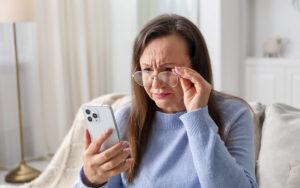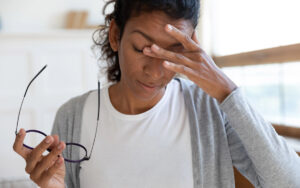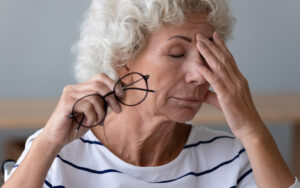Have you ever wondered if some of your choices affect your eyes? Well, they could be! Many people unknowingly affect their eyes and vision based on the choices and activities they participate in.
You could be making these mistakes right now! Learning about your unhealthy choices will help you make better decisions and protect your vision. Therefore, keep reading to learn more about the worst eye care mistakes.
1. Sleeping in contacts
Most people have woken up to the pain and discomfort of sleeping in contacts. The pain often occurs because sleeping in contacts deprives the cornea of oxygen. It is similar to having a foreign object in your eye. You will feel irritated. Depriving your cornea of oxygen will increase the chances of infection and bacteria growth. Therefore, ensure that you take out your contact before sleeping. Even if it’s just a little nap, your eyes will thank you.
2. Sleeping in makeup
You might be too tired to take off your makeup and sleep in it. While it seems innocent, makeup can clog your pores and glands around the eyes. This will cause pimples and increase the chances of developing styes. Blocked glands and pores also increase the chances of infection. Therefore, as tired as you may be, ensure that you take off your makeup before sleeping. This practice benefits not only the area around your eyes but also your overall skin.
3. Wearing expired eye makeup
Over time, expired makeup starts to disintegrate, even if you do not notice it. It makes them unsafe to use as they could leach into the pores, increasing the chances of infection. Old makeup is also more susceptible to bacteria growth, especially if you have not been storing it well. Additionally, dirty brushes hold many germs that clog your pores and increase the chances of bacterial growth. Therefore, replace your old makeup and clean the brushes often.
4. Not wearing sunglasses
Forgetting to wear sunglasses or only wearing them on sunny days does not adequately protect your eyes. Even on cloudy days, ultraviolet (UV) rays can penetrate through, affecting your eyes and skin. Therefore, you have to wear sunglasses to protect your eyes. Even snowy days require sunglasses. Sun reflects on the snow and increases the chances of corneal burns, skin cancer, and spots on the eyes.
5. Buying the wrong sunglasses
And while we’re on the topic of sunglasses, are you buying the right pair? It is easy to pick a glamorous pair from a regular vendor, but you need a good pair that blocks out UV rays. These adequately protect your eyes and vision. If you are unsure what sunglasses to buy, you can always consult an eye expert for the right pair.
6. Using expired eye drops
Your eye drops and lens solutions have an expiry date. These cleaners have components that kill germs and keep them free of bacteria. Therefore, these ingredients have to keep doing their job to keep you from infection. Therefore, these ingredients stop working when the drops and contact solution expire. You will be at risk of infection and prolonged use will eventually give you one. It is best to routinely replace eye drops and lens solutions.
7. Wearing the wrong prescription
Wearing the wrong prescription will strain and affect your eyes. It is similar to wearing someone else’s glasses. Your eyes struggle to focus and adjust just to the lens. This procedure will leave you with a splitting headache and eye strain. People require different eye powers, so wearing the wrong glasses will strain your eyes. Always go to a specialist to get the right glasses. Even if you just need them for reading, it is important to have the correct power.
8. Delaying eye checkups
If your doctor has scheduled an eye checkup, do not skip it. Going for regular and scheduled eye checkups will enhance your eye health. It helps your doctor identify any warning signs of eye diseases. It also lets your doctor adjust your prescription to give you a better pair of glasses. Delaying your eye checkups could let the disease progress, making treatment expensive and sometimes ineffective. Therefore, ensure that you go to your checkup.
9. Too much screen time
Too much screen time is detrimental for you, but not in the way you think. While it will not weaken your eyesight, it will make you strain more. Too much screen time reduces the number of times you blink, meaning your eyes do not receive enough moisture. Additionally, the effects of screens make your vision blurry. Remember to give your eyes a break from screens.
10. Ignoring good nutrition is detrimental to eye health.
Did you know that your diet affects your vision? Maintaining a good diet is vital for your well-being, including your eye health. Therefore, you need to eat food that can prevent or delay macular degeneration. Increase the consumption of eye-healthy nutrients from kale, yellow beans, green peas, and turnips. To improve your eye health, ask your doctor what to eat and add those foods to your diet.
11. Playing sports without protective eyewear
Do you wear protective glasses and gear to protect your face during sports? You should! A ball or bat could come flying into your face, hitting your eye and leaving it severely injured. You could lose your vision as a long-term effect of the injury. Therefore, always wear the right protective gear for your eyes when playing sports. Ask your doctor for recommendations and check reviews to note the best products.
12. Ignoring eye symptoms
If your eyes feel cloudy or watery, have more discharge than usual, or have a bit of discoloration, you should go to the doctor. Ignoring your symptoms could let the disease progress, making treatment less effective and more expensive. If you wait for too long, your vision will be at risk.
13. Rubbing your eyes
And finally, you should avoid rubbing your eyes. As COVID-19 has taught us, your hands and fingers pick up a lot of bacteria and germs. Rubbing your eyes too much will deposit these germs into your eyes, increasing the chances of infection.




